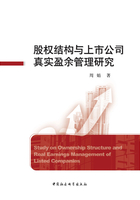
Abstract
In recent years,real earnings management of listed companies has become a hot issue of theoretical and practical fields.Real earnings management affects data offinancial reporting through management's attempt to arrange the business activities,which deviate from normal business operations,violating corporate value maximization,achieving expected standards of financial reporting,to maximize the private benefits of controlling shareholders.It will violate the goal of corporate value maximization,reducing the reliability and authenticity of financial reporting and increasing the company's agency costs.
The ownership structure which determines the allocation of corporate control,is the foundation of corporate governance,thus determining the company's agency relationships and agency problems.Controlling shareholders possessing the rights control the company major economic activities in decision-making,one of which is real earnings management.How does the ownership structure effect real earnings management of listed companies? What role does ownership structure playin real earnings management decision-making? And how does it work? Which characteristic of ownership structure effects real earnings management? This article intends to research the relationship between ownership structure and real earnings management of listed companies in China from the types of controlling shareholders,ownership concentration and check-and-balance of stock ownership,to answer these questions.
In the aspect of types of controlling shareholders,we prove that the types of controlling shareholder impact on real earnings management of listed companies inChina.With the differences of the controlling shareholders' types,the degree of real earnings management of listed companies differentiates significantly.Whether it is from the comprehensive index of real earnings management,or the single indexes,the extent of real earnings management of the state-owned listed companies is lower than the private listed companies;further,the level of real earnings management of listed companies of SOEs affiliated to the central government is directly under SOEs affiliated to the local government(SOELGs).All in all,the extent of real earnings management of SOECGs is the minimum,the real earning management of SOELGs,is in the medium class,the highest is in the private companies.The existence of such differences may be the difference in financial policies,government support,supervision of environmental,and business goal that controlling shareholders of Chinese listed companies faced,resulting in significant differences of motives and the degree of real earning management,for listed companies of different controlling shareholders
In this paper,we prove the ownership concentration affects the real earnings management of listed companies.The degree of ownership concentration affects extent of real earnings management significant differently. The comprehensive index shows that there is a significant U-shaped relationship between ownership concentration and real earnings management of listed companies in China.However,we do not get the same conclusion from single indexes.There is still a significant relationship between the ownership concentration and abnormal production costs.But the relationship between ownership concentration and abnormal cash flow from operating activities isn't show a“U”shape,but a positive liner.Further,there were significant differences between the ownership concentration and real earning management of listed companies in the control of different nature of controlling shareholders.In the state-owned listed enterprises,the other three indexes of real earnings management,that is,the real earnings management comprehensive index,abnormal production costs and abnormal discretionary expenses showing a U-shaped relationship between ownership concentration and significantly in the 1% level,except for abnormal cash flow from operating activities.While in the private listed companies,ownership concentration,and overall real earnings management indexes,including comprehensive index,abnormal cash flow from operations,abnormal production costs and abnormal discretionary expenses have a significant positive correlation,rather than U-shaped relationship.
In this paper,we prove thecheck-and-balance of stock ownership does not play an inhibitory effect on real earnings management of China's listed companies in general.However,there were significant differences between the different samples when we divide the samples depending on the nature of controlling shareholders directly into three groups of SOECGs,SOELGs and private listed companies.For SOECGs The relationship between real earnings management and check-and-balance of stock ownership was a significant negative correlation,excepting abnormal discretionary expenses was not significant,indicating SOECGs,the second largest shareholders plays a certain supervision role depressing the real earnings management behavior of controlling shareholders.For SOELGs,the relationship between check-and-balance of stock ownership and real earnings management is not uncertain,indicating in SOELGs the second largest shareholder did not effectly supervise the controlling shareholder,and did not play an inhibitory effect on real earnings management.For the private listed company,the relationship was a significant positive correlation,indicating that the second largest shareholder in the private listed company,not only failed to play its proper role of checks and balances,but to promote the controlling shareholder's implementation of real earnings management behavior.
Key words:Real Earnings Management,Controlling Shareholders,The Types of Controlling Shareholders,Ownership Concentration,Check-and-Balance of Stock Ownership